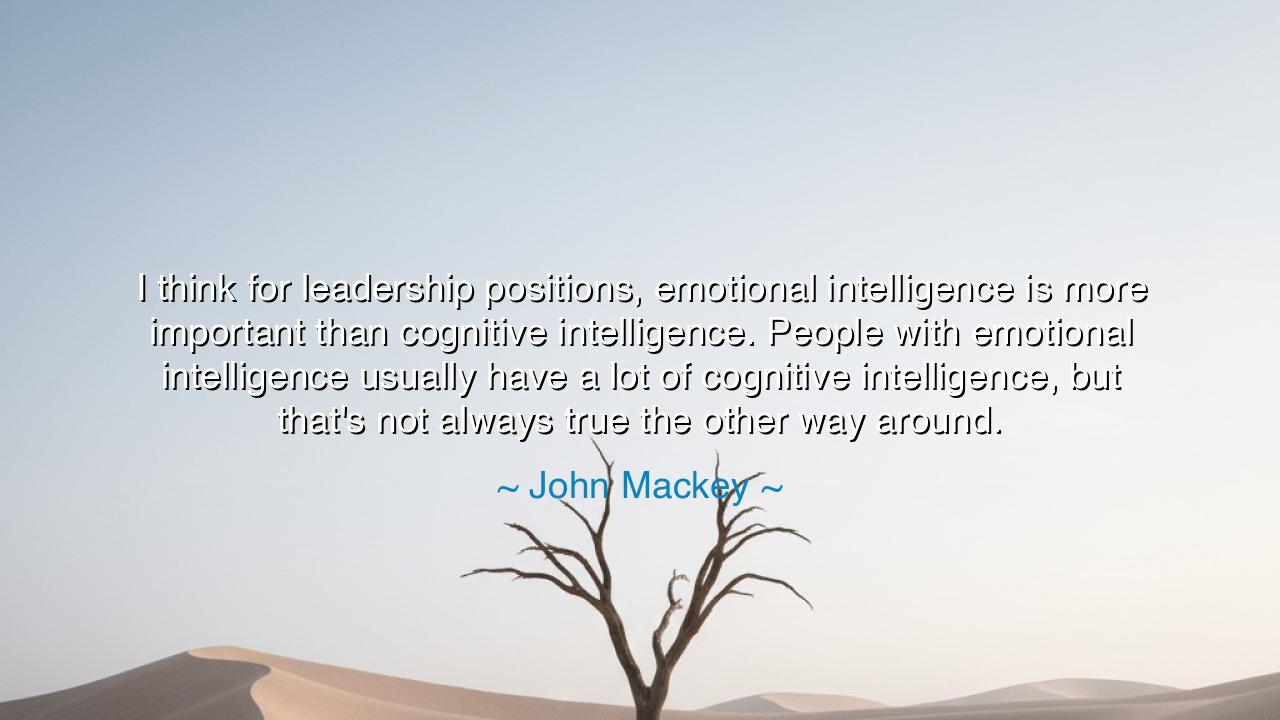
I think for leadership positions, emotional intelligence is more
I think for leadership positions, emotional intelligence is more important than cognitive intelligence. People with emotional intelligence usually have a lot of cognitive intelligence, but that's not always true the other way around.






In the words of John Mackey: “I think for leadership positions, emotional intelligence is more important than cognitive intelligence. People with emotional intelligence usually have a lot of cognitive intelligence, but that’s not always true the other way around.” These words strike at the heart of an eternal truth: that the greatest leaders are not those who know the most, but those who understand the hearts of others. For a ruler may possess vast knowledge, yet without compassion, he will rule like a tyrant. But one who possesses emotional intelligence—the ability to listen, to empathize, to inspire—will bind people together with invisible cords stronger than chains of iron.
The ancients themselves understood this balance. Consider King Solomon, who when offered anything by God did not ask for riches or conquests, but for wisdom to govern his people with justice. His story reveals that true leadership rests not only on knowledge of laws, but on the ability to perceive human hearts. His famous judgment between two women claiming the same child was not a matter of cognitive intelligence alone, but of discernment of emotion, of seeing through to the truth hidden in love and desperation.
History gives us more examples. Abraham Lincoln was not the most scholarly of men, but he possessed profound emotional intelligence. In the furnace of civil war, he soothed a divided nation not only with reason, but with compassion, humility, and the gift of words that touched the soul. His Gettysburg Address was not a triumph of intellectual argument—it was a hymn to human grief and hope, spoken to heal wounds as much as to declare principles. Lincoln’s greatness came not from sharpness of mind alone, but from the depth of his heart.
By contrast, many figures of history remind us of the danger of intellect without empathy. Napoleon was a master of strategy, his cognitive intelligence unmatched on the battlefield. Yet his lack of emotional intelligence—his inability to listen, to temper ambition, to see beyond conquest—led him to ruin. He conquered half of Europe but lost his people’s trust, leaving behind not unity but exhaustion and despair. His brilliance could win wars, but it could not win hearts.
Mackey’s words also speak to us today, in every workplace and community. Many strive to prove themselves by knowledge alone—by being the smartest, the quickest, the most correct. But true leadership demands more: the ability to bring out the best in others, to inspire confidence, to create harmony where there is discord. The one who practices emotional intelligence is like a shepherd who knows each sheep by name, while the purely intellectual leader is like a commander who counts only numbers, forgetting that behind every number is a soul.
The lesson is clear: cultivate not only your mind, but your heart. Read books, sharpen your reason, strengthen your skills—but do not neglect the arts of listening, empathy, patience, and encouragement. In your family, in your work, in your community, remember that people will follow one who makes them feel valued more quickly than one who makes them feel small. Knowledge commands respect; compassion commands loyalty.
Therefore, O seeker, engrave this truth upon your heart: cognitive intelligence may open doors, but emotional intelligence opens hearts. If you would be a true leader, learn not only to think with clarity but to feel with depth. Let your knowledge serve your compassion, and let your compassion guide your knowledge. Then you will lead not as a tyrant of minds, but as a guardian of souls—and your legacy will endure far longer than intellect alone could ever achieve.






AAdministratorAdministrator
Welcome, honored guests. Please leave a comment, we will respond soon